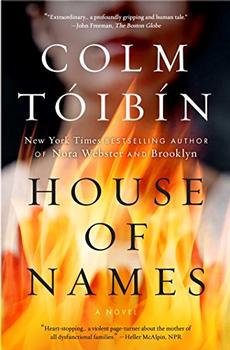Summary | Excerpt | Reading Guide | Reviews | Beyond the Book | Readalikes | Genres & Themes | Author Bio

I was ready as he was not, the hero home in glorious victory, the blood of his daughter on his hands, but his hands washed now as though free of all stain, his hands white, his arms outstretched to embrace his friends, his face all smiles, the great soldier who would soon, he believed, hold up a cup in celebration and put rich food into his mouth. His gaping mouth! Relieved that he was home!
I saw his hands clench in sudden pain, clench in the grim, shocked knowledge that at last it had come to him, and in his own palace, and in the slack time when he was sure he would enjoy the old stone bath and the ease to be found there.
That was what inspired him to go on, he said, the thought that this was waiting for him, healing water and spices and soft, clean clothes and familiar air and sounds. He was like a lion as he laid his muzzle down, his roaring all done, his body limp, and all thought of danger far from his mind.
I smiled and said that, yes, I too had thought of the welcome I would make for him. He had filled my waking life and my dreams, I told him. I had dreamed of him rising all cleansed from the perfumed water of the bath. I told him his bath was being prepared as the food was being cooked, as the table was being laid, and as his friends were gathering. And he must go there now, I said, he must go to the bath. He must bathe, bathe in the relief of being home. Yes, home. That is where the lion came. I knew what to do with the lion once he came home. .
*
I had spies to tell me when he would come back. Men lit each fire that gave the news to farther hills where other men lit fires to alert me. It was the fire that brought the news, not the gods. Among the gods now there is no one who offers me assistance or oversees my actions or knows my mind. There is no one among the gods to whom I appeal. I live alone in the shivering, solitary knowledge that the time of the gods has passed.
I am praying to no gods. I am alone among those here because I do not pray and will not pray again. Instead, I will speak in ordinary whispers. I will speak in words that come from the world, and those words will be filled with regret for what has been lost. I will make sounds like prayers, but prayers that have no source and no destination, not even a human one, since my daughter is dead and cannot hear.
I know as no one else knows that the gods are distant, they have other concerns. They care about human desires and antics in the same way that I care about the leaves of a tree. I know the leaves are there, they wither and grow again and wither, as people come and live and then are replaced by others like them. There is nothing I can do to help them or prevent their withering. I do not deal with their desires.
I wish now to stand here and laugh. Hear me tittering and then howling with mirth at the idea that the gods allowed my husband to win his war, that they inspired every plan he worked out and every move he made, that they knew his cloudy moods in the morning and the strange and silly exhilaration he could exude at night, that they listened to his implorings and discussed them in their godly homes, that they watched the murder of my daughter with approval.
The bargain was simple, or so he believed, or so his troops believed. Kill the innocent girl in return for a change in the wind. Take her out of the world, use a knife on her flesh to ensure that she would never again walk into a room or wake in the morning. Deprive the world of her grace. And as a reward, the gods would make the wind blow in her father's favor on the day he needed wind for his sails. They would hush the wind on the other days when his enemies needed it. The gods would make his men alert and brave and fill his enemies with fear. The gods would strengthen his swords and make them swift and sharp.
When he was alive, he and the men around him believed that the gods followed their fates and cared about them. Each of them. But I will say now that they did not, they do not. Our appeal to the gods is the same as the appeal a star makes in the sky above us before it falls, it is a sound we cannot hear, a sound to which, even if we did hear it, we would be fully indifferent. The gods have their own unearthly concerns, unimagined by us. They barely know we are alive. For them, if they were to hear of us, we would be like the mild sound of wind in the trees, a distant, unpersistent, rustling sound.
Excerpted from House of Names by Colm Toibin. Copyright © 2017 by Colm Toibin. Reprinted with permission of Scribner, a Division of Simon & Schuster, Inc.
Your guide toexceptional books
BookBrowse seeks out and recommends the best in contemporary fiction and nonfiction—books that not only engage and entertain but also deepen our understanding of ourselves and the world around us.